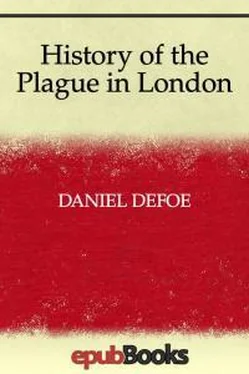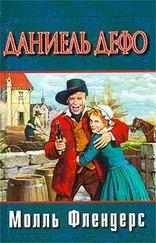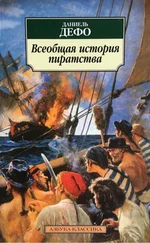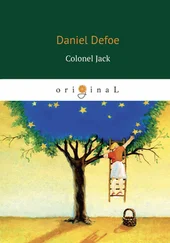Даниэль Дефо - History of the Plague in London
Здесь есть возможность читать онлайн «Даниэль Дефо - History of the Plague in London» весь текст электронной книги совершенно бесплатно (целиком полную версию без сокращений). В некоторых случаях можно слушать аудио, скачать через торрент в формате fb2 и присутствует краткое содержание. Год выпуска: 2014, Издательство: epubBooks Classics, Жанр: Историческая проза, на английском языке. Описание произведения, (предисловие) а так же отзывы посетителей доступны на портале библиотеки ЛибКат.
- Название:History of the Plague in London
- Автор:
- Издательство:epubBooks Classics
- Жанр:
- Год:2014
- ISBN:нет данных
- Рейтинг книги:4 / 5. Голосов: 1
-
Избранное:Добавить в избранное
- Отзывы:
-
Ваша оценка:
- 80
- 1
- 2
- 3
- 4
- 5
History of the Plague in London: краткое содержание, описание и аннотация
Предлагаем к чтению аннотацию, описание, краткое содержание или предисловие (зависит от того, что написал сам автор книги «History of the Plague in London»). Если вы не нашли необходимую информацию о книге — напишите в комментариях, мы постараемся отыскать её.
History of the Plague in London — читать онлайн бесплатно полную книгу (весь текст) целиком
Ниже представлен текст книги, разбитый по страницам. Система сохранения места последней прочитанной страницы, позволяет с удобством читать онлайн бесплатно книгу «History of the Plague in London», без необходимости каждый раз заново искать на чём Вы остановились. Поставьте закладку, и сможете в любой момент перейти на страницу, на которой закончили чтение.
Интервал:
Закладка:
As the desolation was greater during those terrible times, so the amazement of the people increased; and a thousand unaccountable things they would do in the violence of their fright, as others did the same in the agonies of their distemper: and this part was very affecting. Some went roaring, and crying, and wringing their hands, along the street; some would go praying, and lifting up their hands to heaven, calling upon God for mercy. I cannot say, indeed, whether this was not in their distraction; but, be it so, it was still an indication of a more serious mind when they had the use of their senses, and was much better, even as it was, than the frightful yellings and cryings that every day, and especially in the evenings, were heard in some streets. I suppose the world has heard of the famous Solomon Eagle, an enthusiast. He, though not infected at all, but in his head, went about denouncing of judgment upon the city in a frightful manner; sometimes quite naked, and with a pan of burning charcoal on his head. What he said or pretended, indeed, I could not learn.
I will not say whether that clergyman was distracted or not, or whether he did it out of pure zeal for the poor people, who went every evening through the streets of Whitechapel, and, with his hands lifted up, repeated that part of the liturgy of the church continually, "Spare us, good Lord; spare thy people whom thou hast redeemed with thy most precious blood." I say I cannot speak positively of these things, because these were only the dismal objects which represented themselves to me as I looked through my chamber windows; for I seldom opened the casements while I confined myself within doors during that most violent raging of the pestilence, when indeed many began to think, and even to say, that there would none escape. And indeed I began to think so too, and therefore kept within doors for about a fortnight, and never stirred out. But I could not hold it. Besides, there were some people, who, notwithstanding the danger, did not omit publicly to attend the worship of God, even in the most dangerous times. And though it is true that a great many of the clergy did shut up their churches and fled, as other people did, for the safety of their lives, yet all did not do so. Some ventured to officiate, and to keep up the assemblies of the people by constant prayers, and sometimes sermons, or brief exhortations to repentance and reformation; and this as long as they would hear them. And dissenters [167] All Protestant sects other than the Established Church of England.
did the like also, and even in the very churches where the parish ministers were either dead or fled; nor was there any room for making any difference at such a time as this was.
It pleased God that I was still spared, and very hearty and sound in health, but very impatient of being pent up within doors without air, as I had been for fourteen days or thereabouts. And I could not restrain myself, but I would go and carry a letter for my brother to the posthouse; then it was, indeed, that I observed a profound silence in the streets. When I came to the posthouse, as I went to put in my letter, I saw a man stand in one corner of the yard, and talking to another at a window; and a third had opened a door belonging to the office. In the middle of the yard lay a small leather purse, with two keys hanging at it, with money in it; but nobody would meddle with it. I asked how long it had lain there. The man at the window said it had lain almost an hour, but they had not meddled with it, because they did not know but the person who dropped it might come back to look for it. I had no such need of money, nor was the sum so big that I had any inclination to meddle with it or to get the money at the hazard it might be attended with: so I seemed to go away, when the man who had opened the door said he would take it up, but so that, if the right owner came for it, he should be sure to have it. So he went in and fetched a pail of water, and set it down hard by the purse, then went again and fetched some gunpowder, and cast a good deal of powder upon the purse, and then made a train from that which he had thrown loose upon the purse (the train reached about two yards); after this he goes in a third time, and fetches out a pair of tongs red hot, and which he had prepared, I suppose, on purpose; and first setting fire to the train of powder, that singed the purse, and also smoked the air sufficiently. But he was not content with that, but he then takes up the purse with the tongs, holding it so long till the tongs burnt through the purse, and then he shook the money out into the pail of water: so he carried it in. The money, as I remember, was about thirteen shillings, and some smooth groats [168] A groat equals fourpence, about eight cents. It is not coined now.
and brass farthings. [169] A farthing equals one quarter of a penny.
Much about the same time, I walked out into the fields towards Bow; for I had a great mind to see how things were managed in the river and among the ships; and, as I had some concern in shipping, I had a notion that it had been one of the best ways of securing one's self from the infection to have retired into a ship. And, musing how to satisfy my curiosity in that point, I turned away over the fields, from Bow to Bromley, and down to Blackwall, to the stairs that are there for landing, or taking water.
Here I saw a poor man walking on the bank, or "sea wall" as they call it, by himself. I walked awhile also about, seeing the houses all shut up. At last I fell into some talk, at a distance, with this poor man. First I asked how people did thereabouts. "Alas, sir!" says he, "almost desolate, all dead or sick; here are very few families in this part, or in that village," pointing at Poplar, "where half of them are not dead already, and the rest sick." Then he, pointing to one house, "They are all dead," said he, "and the house stands open: nobody dares go into it. A poor thief," says he, "ventured in to steal something; but he paid dear for his theft, for he was carried to the churchyard too, last night." Then he pointed to several other houses. "There," says he, "they are all dead, the man and his wife and five children. There," says he, "they are shut up; you see a watchman at the door:" and so of other houses. "Why," says I, "what do you here all alone?"—"Why," says he, "I am a poor desolate man: it hath pleased God I am not yet visited, though my family is, and one of my children dead."—"How do you mean, then," said I, "that you are not visited?"—"Why," says he, "that is my house," pointing to a very little low boarded house, "and there my poor wife and two children live," said he, "if they may be said to live; for my wife and one of the children are visited; but I do not come at them." And with that word I saw the tears run very plentifully down his face; and so they did down mine too, I assure you.
"But," said I, "why do you not come at them? How can you abandon your own flesh and blood?"—"O sir!" says he, "the Lord forbid! I do not abandon them, I work for them as much as I am able; and, blessed be the Lord! I keep them from want." And with that I observed he lifted up his eyes to heaven with a countenance that presently told me I had happened on a man that was no hypocrite, but a serious, religious, good man; and his ejaculation was an expression of thankfulness, that, in such a condition as he was in, he should be able to say his family did not want. "Well," says I, "honest man, that is a great mercy, as things go now with the poor. But how do you live, then, and how are you kept from the dreadful calamity that is now upon us all?"—"Why, sir," says he, "I am a waterman, and there is my boat," says he, "and the boat serves me for a house; I work in it in the day, and I sleep in it in the night: and what I get I lay it down upon that stone," says he, showing me a broad stone on the other side of the street, a good way from his house; "and then," says he, "I halloo and call to them till I make them hear, and they come and fetch it."
Читать дальшеИнтервал:
Закладка:
Похожие книги на «History of the Plague in London»
Представляем Вашему вниманию похожие книги на «History of the Plague in London» списком для выбора. Мы отобрали схожую по названию и смыслу литературу в надежде предоставить читателям больше вариантов отыскать новые, интересные, ещё непрочитанные произведения.
Обсуждение, отзывы о книге «History of the Plague in London» и просто собственные мнения читателей. Оставьте ваши комментарии, напишите, что Вы думаете о произведении, его смысле или главных героях. Укажите что конкретно понравилось, а что нет, и почему Вы так считаете.












